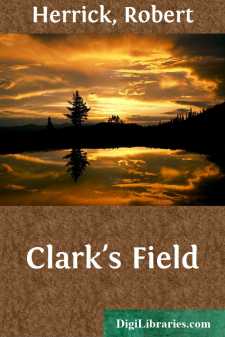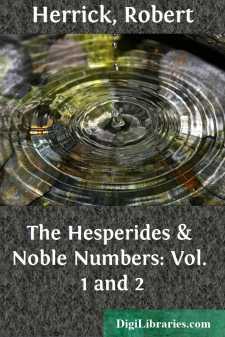Categories
- Antiques & Collectibles 13
- Architecture 36
- Art 48
- Bibles 22
- Biography & Autobiography 813
- Body, Mind & Spirit 142
- Business & Economics 28
- Children's Books 17
- Children's Fiction 14
- Computers 4
- Cooking 94
- Crafts & Hobbies 4
- Drama 346
- Education 46
- Family & Relationships 57
- Fiction 11829
- Games 19
- Gardening 17
- Health & Fitness 34
- History 1377
- House & Home 1
- Humor 147
- Juvenile Fiction 1873
- Juvenile Nonfiction 202
- Language Arts & Disciplines 88
- Law 16
- Literary Collections 686
- Literary Criticism 179
- Mathematics 13
- Medical 41
- Music 40
- Nature 179
- Non-Classifiable 1768
- Performing Arts 7
- Periodicals 1453
- Philosophy 64
- Photography 2
- Poetry 896
- Political Science 203
- Psychology 42
- Reference 154
- Religion 513
- Science 126
- Self-Help 84
- Social Science 81
- Sports & Recreation 34
- Study Aids 3
- Technology & Engineering 59
- Transportation 23
- Travel 463
- True Crime 29
Clark's Field
by: Robert Herrick
Description:
Excerpt
CLARK'S FIELD
The other day I happened to be in the town where I was born and not far from the commonplace house in the humbler quarter of the town where my parents were living at the time of my birth, half a century and more ago. I am not fond of my native town, although I lived in the place until I was seventeen or eighteen years old. It was never a distinguished spot and seems to have gained nothing as yet from having been my birthplace. It has some reputation of its own, however, but that is due to the enduring popularity of a certain cookstove that has long been manufactured there, the "Stearns and Frost Cooker," known to many housewives of several generations. In my youth the Stearns and Frost stove works were reputed to be the largest in the world, and most of the plain citizens of Alton were concerned in one way or another with them. I do not happen to be interested in the manufacture or sale, or I may add the use, of the domestic cookstove. As a boy I always thought the town a dull, ugly sort of place, and although it has grown marvelously these last thirty years, having been completely surrounded and absorbed by the neighboring city of B——, it did not seem to me that day when I revisited it to have grown perceptibly in grace....
Having a couple of spare hours before meeting a dinner engagement, I descended into a subway and was shot out in less than ten minutes from the heart of the city to the old "Square" of Alton,—a journey that took us formerly from half to three quarters of an hour, and in cold or rainy weather, of which there is a good deal in Alton, seemed truly interminable. From the "Square," which no longer had the noble amplitude of my memory, the direct way to Fuller Place lay up the South Road,—a broad thoroughfare, through the center of which there used to trickle occasionally a tiny horse-drawn vehicle to and from the great city of B——. South Road, I found, had changed its name to the more pompous designation of State Avenue, and it was noisy and busy enough to accord with my childish imagination of it, but none too large for the mammoth moving-vans in which the electric railroad now transported the inhabitants. These shot by me in bewildering numbers. I had chosen to make the rest of my journey on foot, trying leisurely to revive old memories and sensations. For a few blocks I succeeded in picking out here and there a familiar object, but by the time I reached the cross-street where we used to descend from the street-cars and penetrate the lane that led to Fuller Place I was completely at sea. The ample wooden houses fronting the South Road, each surrounded by its green lawn with appropriate shrubbery, had all given way before the march of brick business blocks. Even the "Reformed Methodist" church on the corner of Lamb Street had been replaced by a stone structure that discreetly concealed its denominational quality from the passer-by. Beyond the church there had been a half-mile of unoccupied land fronting on the Road, but now the line of "permanent improvements" ran unbroken as far as the eye could see....










